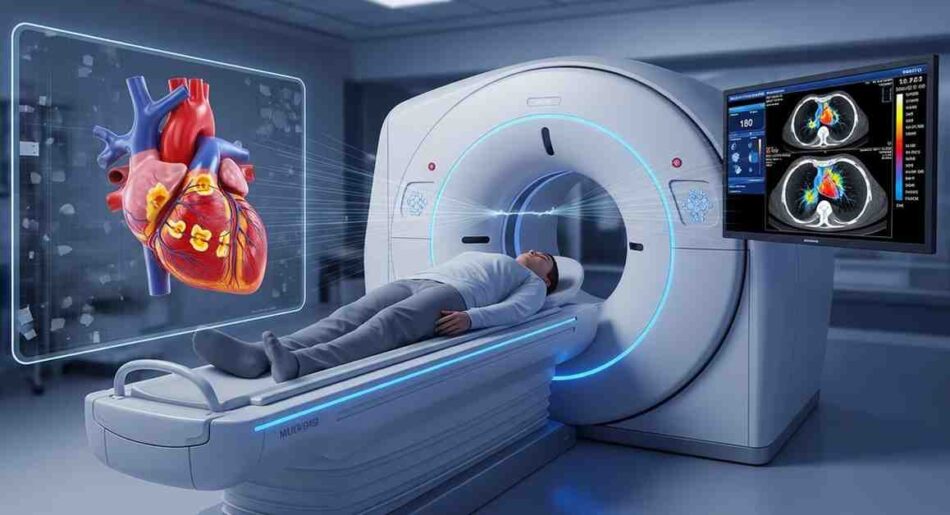Body imaging scans are the key procedure used to detect a number of diseases at an early stage worldwide. Their advent has not only made the diagnosis of chronic disease prompt but has also simplified the approach to a large extent. They have also ensured that the process involved is safer, secure, and less invasive. A heart scan is also an example of a body imaging scan used to detect heart diseases at an early stage. For more information on a heart scan, please read this article till the very end.
What Is a Heart Scan: Why You Might Need One Sooner Than You Think
A heart scan is a form of body imaging scan that employs the latest CT scan technology to capture images of the heart for detecting potential abnormalities. The main aim behind this is to assess heart health and detect diseases before it is too late. Early detection of chronic diseases, especially heart-related, is crucial to ensure a successful prognosis post-treatment. If heart diseases are not diagnosed early and tend to progress, it gets really challenging to treat them, which could be life-threatening in most cases.
Types of Heart Scans: What Each of Them Is Used For
There are different types of heart scans, each catering to a distinct purpose. The key ones include:
· Coronary CT Scan: Used to examine the arteries and help identify coronary artery disease.
· Calcium Score Test: Used to examine calcium buildup in the arteries, a key reason behind many heart diseases.
· Cardiac CT Angiography: Used to assess blocking and narrowing in the heart.
Chest Pain, Fatigue, or Shortness of Breath? A Heart Scan Could Reveal the Hidden Cause
If you are experiencing symptoms such as persistent chest pain, fatigue, and shortness of breath, then a heart scan is ideally the best option for you to have a quick assessment of your heart health. The mentioned symptoms usually indicate an underlying heart issue, which you should diagnose early for a quick fix. Prolonging the diagnosis could result in severe, harmful outcomes for you, even an unforeseen cardiac arrest that could be deadly. The key heart diseases that a heart scan can detect include coronary artery disease, congenital heart disease, cardiomyopathy, blockage and narrowing in the arteries, etc.
Feeling Fine? Here’s Why You Still Might Need a Heart Scan
Not only should you get a heart scan if you’re experiencing any kind of symptoms, but you should also opt for it routinely to assess your heart health. Many times, you could have an underlying heart issue without experiencing any symptoms. A heart scan can help identify calcium buildup and narrowing in the arteries, which is the leading sign of heart disease worldwide. The approach of a heart scan is extremely comprehensive, detecting heart issues when symptoms are less noticeable, which makes it ideal for detecting heart issues you can’t even feel.
Are You at Risk? The Best Candidates for a Heart Scan
Though anyone can get a heart scan done, the following people should take one as their top priority:
· Family History: Those who have had a family history of heart disease.
· Experiencing Symptoms: Those experiencing symptoms like chest pain, shortness of breath, etc.
· Elderly: Those who experience no symptoms but are aged over 40 years.
· Prone: Those who have already had a heart attack once, and are prone to another one in the future.
If you belong to a group of any such people, get a heart scan as early as possible. You can also get a full body screening to have a more comprehensive analysis. But make sure you opt for a reliable lab, such as Via Body Scan, for a streamlined experience.
CONCLUSION
A heart scan is a form of body imaging scan that employs the latest CT scan technology to capture images of the heart for detecting potential abnormalities. If you are experiencing symptoms such as persistent chest pain, fatigue, and shortness of breath, then a heart scan is ideally the best option for you to assess your heart health. Not only should you get a heart scan if you’re experiencing symptoms, but you should also opt for it routinely to assess your heart health. It can detect diseases you can’t feel by monitoring the calcium buildup and narrowing in your arteries. If you are seeking a heart scan, opt for a reliable lab, such as Via Body Scan, to have a smooth experience.
Go here for more health related articles






